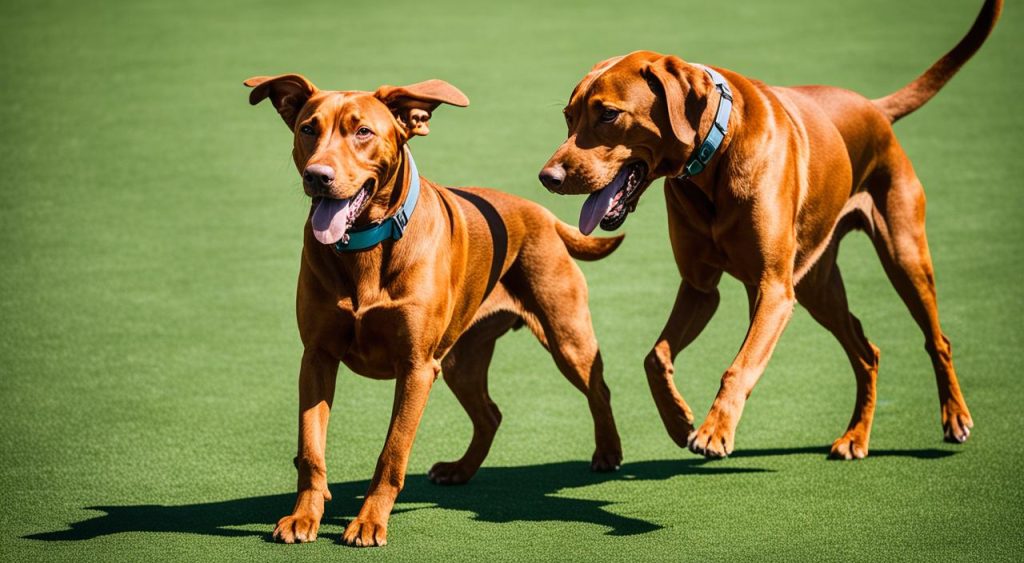Vizslas, known for their friendly and gentle nature, are generally not aggressive dogs. However, it’s important to remember that every dog is unique and there can be exceptions to this general temperament. Some Vizslas may display aggressive behavior if they have not received proper training or socialization.
To prevent aggressive tendencies in Vizslas, it is essential to understand the individual dog’s temperament and provide appropriate training and socialization. This will help them develop good behavior and prevent any potential aggression.
Key Takeaways:
- Vizslas are typically friendly and gentle dogs.
- Proper training and socialization are important to prevent aggression.
- Understanding your Vizsla’s temperament is crucial in managing their behavior.
- Boredom, fear, lack of socialization, and learned behavior can contribute to aggression in Vizslas.
- Seeking professional help from a dog trainer or behaviorist is recommended for handling aggression issues.
The Vizsla Temperament
Vizslas are known for their calm and dependable temperament. They are friendly dogs that get along well with their owners, other humans, and pets. They are intelligent and eager to please, but can become a challenge if not given proper training and activities.
“Intelligent and eager to please, Vizslas are a joy to train and respond well to positive reinforcement techniques.”
To ensure a well-behaved Vizsla, it is important to provide them with mental and physical stimulation. Vizslas need activities that engage their minds and prevent boredom, as this can lead to potential destructive behavior. Regular exercise is also crucial for their well-being as Vizslas are an energetic breed that thrives on physical activity.
While Vizslas are highly affectionate, their energy levels require outlets to keep them happy and content. Interactive games, puzzle toys, and obedience training can help fulfill their need for mental stimulation, while activities like long walks, runs, and playing fetch provide the physical exercise they crave.
“A tired Vizsla is a happy Vizsla, so make sure to provide them with plenty of exercise and mental challenges.”
Understanding and catering to the Vizsla temperament is key to building a strong bond and preventing behavioral issues. By giving them the necessary training, structure, and activities, you can ensure that your Vizsla is a well-adjusted and delightful companion.
Reasons for Aggression in Vizslas
While Vizslas are known for their friendly and gentle nature, there are certain factors that can contribute to aggressive behavior in some individuals. Understanding these reasons can help in managing and preventing aggression in Vizslas.
Boredom: Lack of mental and physical stimulation can lead to aggression in Vizslas. These active dogs have a lot of energy that needs to be properly channeled. Without sufficient exercise and mental stimulation, they may become bored and resort to destructive or aggressive behavior. It is important to provide them with regular exercise and engage them in activities that keep their body and mind active.
Fear: Like any other breed, Vizslas may display aggression when they feel threatened or fearful. They have a natural instinct to protect themselves or their family, and this can manifest as aggression. It is essential to create a safe and secure environment for your Vizsla and minimize situations that may trigger fear or anxiety.
Lack of Socialization: Proper socialization from an early age is crucial for Vizslas to develop good behavior and interact well with other animals and humans. A lack of socialization can lead to fear or anxiety in unfamiliar situations, which may escalate into aggression. It is important to expose your Vizsla to a variety of experiences, sights, and sounds, and introduce them to different people and animals in a positive and controlled manner.
Learned Behavior and Over-Protectiveness: Sometimes, aggression in Vizslas can be learned or reinforced through their environment or previous experiences. If they have experienced situations where aggression was rewarded or allowed, they may continue to display aggressive behavior. Additionally, Vizslas can be naturally protective of their family, which, if not managed properly, can turn into aggression. It is important to provide consistent training and establish clear boundaries to prevent the development of aggressive tendencies.
By understanding the reasons behind aggression in Vizslas, you can take proactive steps in managing their behavior and creating a safe and harmonious environment for both your Vizsla and those around them.
How to Handle Aggression in Vizslas
If you are dealing with aggression in your Vizsla, it is important to seek professional help from a reputable dog trainer or behaviorist. They can assess the specific situation and provide guidance on how to manage and address the aggression.
Tips for handling an aggressive Vizsla may include:
Proper exercise and mental stimulation: Vizslas are an active breed and need outlets for their energy. Regular exercise can help reduce aggression and prevent destructive behavior.
Obedience training: Teaching your Vizsla basic commands and boundaries is essential for managing their behavior and addressing aggression.
Socialization: Exposing your Vizsla to different environments, people, and animals can help reduce fear-based aggression and improve their overall social behavior.
Positive reinforcement techniques: Rewarding good behavior with treats, praise, and affection can encourage desirable behavior and discourage aggression.
It is crucial to address aggression early on and create a safe and structured environment for your Vizsla. With the right approach and guidance, you can effectively manage and overcome aggression in your beloved pet.
Preventing Aggression in Vizslas
While not all Vizslas are prone to aggression, there are steps you can take to prevent the development of aggressive behavior. Here are some strategies to help you manage and train your Vizsla:
Regular Exercise:
Regular exercise is essential for Vizslas to burn off excess energy and reduce the likelihood of destructive or aggressive behavior. Engage your Vizsla in daily physical activities such as walks, runs, or playtime in a secure area.
Obedience Training:
Obedience training is crucial for establishing boundaries and teaching your Vizsla appropriate behavior. Start training from a young age and use positive reinforcement techniques to encourage good manners and discourage any signs of aggression.
Socialization:
Socialization is key to helping your Vizsla become comfortable around other animals and humans. Expose them to different environments, situations, and people in a positive and controlled manner. This will reduce the likelihood of aggressive reactions and help them develop good social skills.
Consistency and Positive Reinforcement:
Consistency is vital in managing and preventing aggression in Vizslas. Set clear rules and boundaries and reinforce positive behaviors with rewards and praise. Avoid punishment or harsh methods, as these can exacerbate aggression in sensitive Vizslas.
By following these guidelines and taking a proactive approach to managing Vizsla aggression, you can help ensure a well-behaved and balanced dog. Remember, patience and understanding are key in creating a harmonious relationship with your Vizsla.
Conclusion
Vizslas are renowned for their friendly and gentle temperament, making them a popular choice for families. While they are not typically aggressive, it is important to remember that individual dogs may exhibit aggressive behavior due to various factors. To manage and prevent aggression in Vizslas, proper training, socialization, and regular exercise are essential.
Understanding the unique needs and behaviors of Vizslas is crucial in creating a positive and structured environment for them. By providing obedience training from an early age, you can establish boundaries and teach your Vizsla appropriate behavior, reducing the likelihood of aggression. Additionally, socializing your Vizsla with other animals and humans will help them feel comfortable and prevent aggressive reactions.
Managing Vizsla aggression requires consistency, positive reinforcement, and patience. Seeking professional guidance from a reputable dog trainer or behaviorist is recommended if you are dealing with aggression in your Vizsla. They can assess the situation, provide tailored advice, and help create a safe and structured environment.
With the right care, attention, and proper management, Vizslas can thrive as loving and well-behaved family pets. Understanding their temperament and taking proactive measures to prevent and address aggression will ensure a happy and harmonious relationship with your Vizsla.





